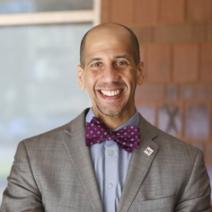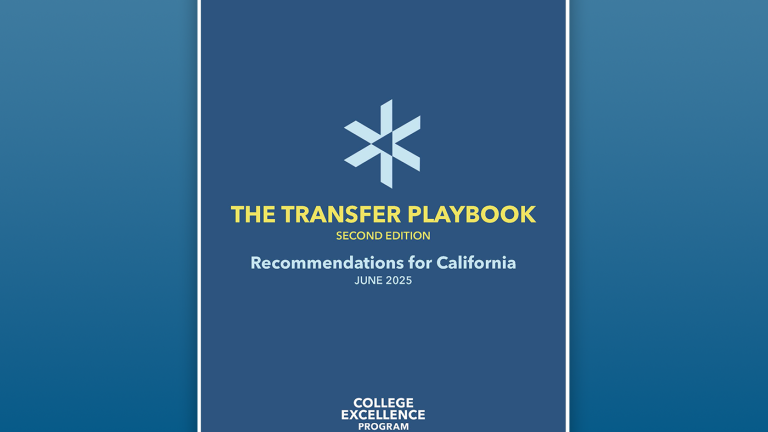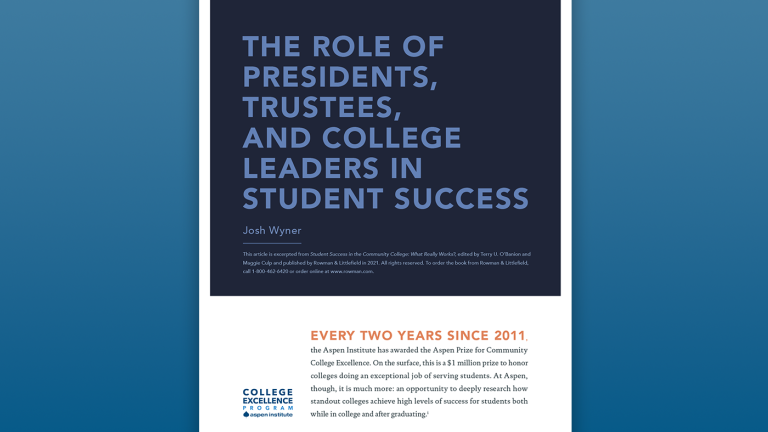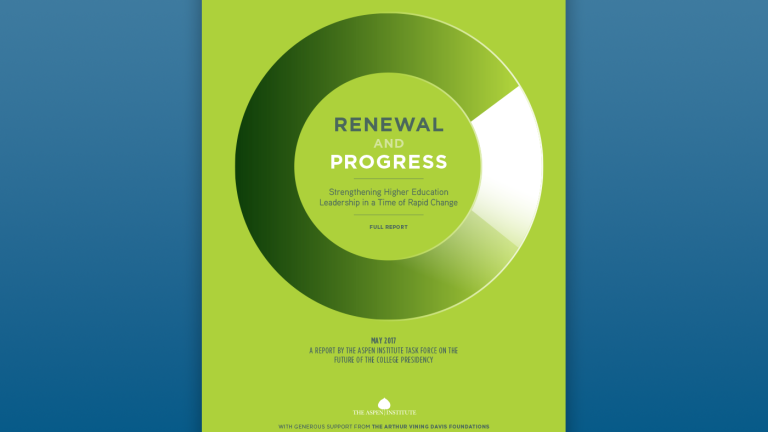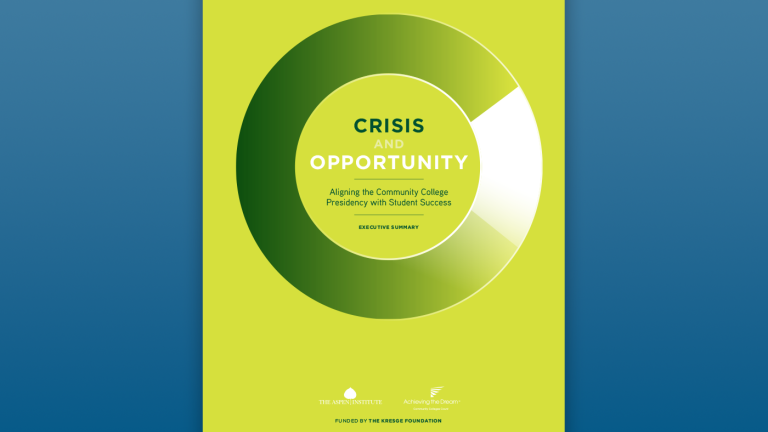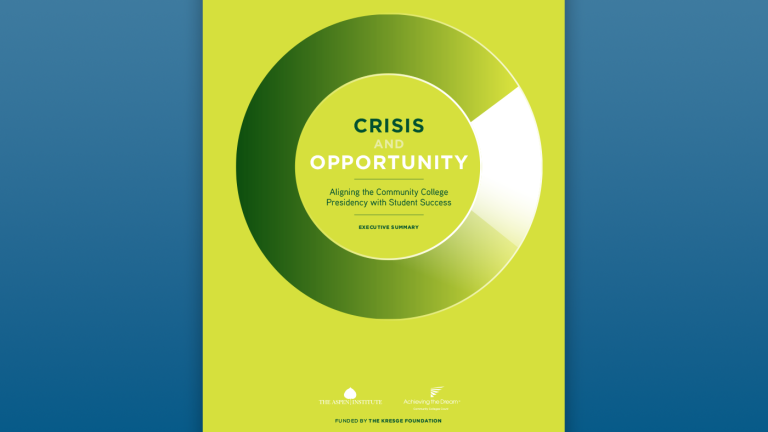State & System Engagement
Aspen partners with states and higher education systems to deliver professional development for college presidents, trustees, institutional leadership teams, and mid-level leaders on improving student outcomes. Our extensive curriculum, data reports, and assessment tools form the basis of customized programming that varies from a single day to multiple days over a full year (or longer).
Introduction
Aspen partners with state and system leaders to provide professional development to institutional leaders on how to advance student success and develop the institutional capacities needed to enact scaled and sustained reforms. We deliver virtual and in-person programs for presidents, their trustees, leadership teams, and mid-level leaders using research from the Aspen Prize process, Aspen’s playbooks and publications, and other field research. Curricular modules include student success strategies in access, completion, transfer, workforce, and teaching and learning. We also offer sessions on six institutional capacities: senior teams, boards, strategic finance, human capital, data use, and implementation systems. Programming is customized with state and system partners to align with their goals, contexts, and audiences. Our state and system engagements are designed to lead to practical reform strategies and plans, and include presentations from senior Aspen staff, Aspen Senior Fellows and other field experts as well as group activities centered around data analysis, qualitative assessment results, and guided questions and discussion.
Leadership Academy for Student Success
The Leadership Academy for Student Success is designed to provide mid-level community college staff and faculty with an understanding of critical student success and change management concepts. The goal is to prepare them to advance to more senior-level positions in their institutions or more effectively lead from their current roles. Originally launched in 2019 through a partnership with the National Center for Inquiry and Improvement (NCII) and the Ohio Association of Community Colleges’ Success Center (OACCSC), NCII expanded this effort in 2023 with support from the Ascendium Education Group, ECMC Foundation, and the Kresge Foundation. The Academy now includes cohorts in Arizona, Michigan, New York, Ohio, Texas, and Washington.
The Leadership Academy Open-Source Curriculum
The Academy’s curriculum draws from Aspen’s fellowship curriculum and is available as an open-source resource for independent use, with the ultimate goal of developing excellent leaders in higher education. The curriculum is based on findings from the Aspen Institute College Excellence Program’s research and includes aligned small group discussion activities and prompts to deepen and apply learning. While originally intended for an audience of mid-level community college leaders, these resources may be adapted for any audience interested in improving community college outcomes. These Leadership Academy modules are designed for delivery in a progressive sequence, though modules may be delivered individually or in a modified sequence for targeted learning. Additionally, these modules are designed for in-person delivery; however, all modules may be adapted for virtual delivery, and suggestions are in the facilitation guides.
These materials are available for open-access use. Individuals and organizations using the materials must clearly attribute the work to the Aspen Institute College Excellence Program and the National Center for Inquiry and Improvement. If you have questions about use of the materials, please contact Millicent.Bender@aspeninstitute.org.
Leadership Academy Open-Source Materials
This curriculum is designed with 10 modules in a progressive sequence, though individual modules may be delivered individually for targeted learning. The modules were originally presented across six sessions in the sequence seen below.
Each module below includes a slide deck with talking points, a facilitation guide that outlines how you can tailor the content for your context, and a participant toolkit with activities, guiding questions, and space for note-taking. Some modules also include case studies of colleges that have effectively improved student outcomes at scale.
Click on a module link below to download the materials package.
Session 1: The Essential Roles of Leadership in Student Success
Session 2: Keeping Students’ End Goals in Mind
- Module 2: Improving Labor Market Outcomes (download materials)
- Module 3: Improving Transfer at Scale (download materials)
Session 3: The Student Experience
- Module 4: Improving Teaching and Learning (download materials)
- Module 5: Aligning Completion Strategies to Post-Graduation Success (download materials)
Session 4: Transformational Leadership for Student Success
Session 5: Institutional Capacities to Advance Reform
- Module 7: Leading Finance Strategically to Advance Reforms (download materials)
- Module 8: Leading Strong Teams for Transformational Change (download materials)
Session 6: Strategic External Partnerships and the Leadership Journey
Maryland Transfer Intensive Program
The Maryland Transfer Intensive (Maryland Intensive) is a multi-year initiative aimed at substantially improving transfer and bachelor’s attainment outcomes for community college students across Maryland. The goal of the program is to support greater economic mobility and security for Maryland residents and develop a diverse talent pool to strengthen the state’s workforce and communities. The Maryland Intensive is a collaboration with the Maryland Higher Education Commission (MHEC) and is supported by the Michael & Susan Dell Foundation.
Our Approach and Mission
The Maryland Statewide Transfer Intensive program is committed to driving meaningful improvements by focusing on:
- Data and Analytics: Enhancing data collection and utilization to better inform transfer pathways.
- Leadership Engagement: Activating state and institutional leaders to prioritize transfer student success.
- Institutional and Partnership Practices: Strengthening and scaling proven practices that foster strong and improving transfer outcomes and experiences.
Key Dates
- Maryland Transfer Intensive Kick Off: February 4, 2025
- Designing Transformational Transfer Models [In-Person]: June 25, 2025
Download a PDF of the full program schedule.
Questions?
Contact Program Manager Bernard Huggins with any questions: bernard.huggins@aspeninstitute.org
Presidents & Trustees Collaborative
The Presidents & Trustees Collaborative is an initiative designed to strengthen the capacity of dozens of community college presidents and their boards of trustees to sustain systemic reforms that improve student outcomes. This project is made possible by support from the Ascendium Education Group.
Through a year-long series of sessions, presidents and trustees are guided through Aspen’s trustee framework and learn lessons from Aspen Prize-winning colleges—all with the ultimate goal of strengthening their capacity to align decision-making with their colleges' student-success reform priorities.
Learn more about the Presidents & Trustees Collaborative here.
Transfer Playbook 2.0: Recommendations for California
The Aspen Institute College Excellence Program developed six recommendations for California based on findings from The Transfer Playbook 2.0, co-authored with the Community College Research Center. The playbook highlights evidence-based practices that improve transfer outcomes at scale—insights that are especially relevant as too few California community college students, particularly those from historically underserved groups, earn a four-year degree despite statewide efforts to improve transfer.
To help build on the state’s progress, Aspen—supported by the College Futures Foundation—partnered with The RP Group and the Campaign for College Opportunity to translate these national findings into six actionable, California-specific recommendations.
This work offers practical guidance for policymakers, system leaders, advocates, and philanthropists committed to improving outcomes for each and every student who needs or wants to transfer and attain a bachelor’s degree.
Contact Us
For more information, please contact: Millicent Bender, Director, Curriculum









